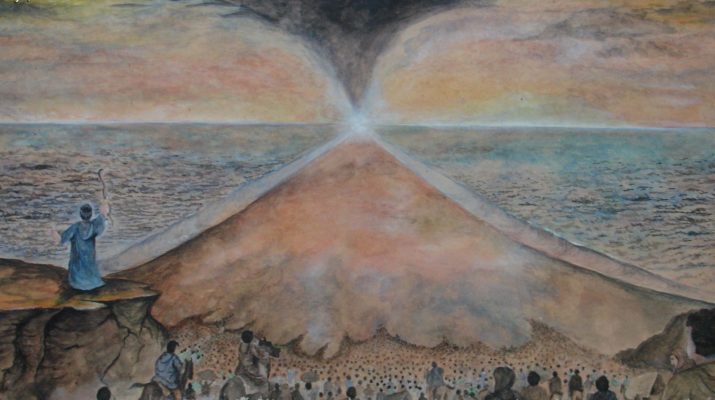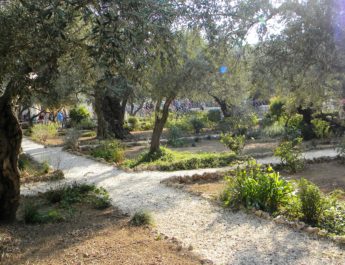Psalm 66
To the leader.I A Song. A Psalm.II
1 Make a joyful noiseIII to God,IV all the earth;V
I “leader” = natsach. Properly, something that glitters from a distance. So, something that stands out, excels, has status/standing (such as a chief musician or superintendent of Temple services). This can also mean to be permanent or enduring.
II “Psalm” = mizmor. From zamar (making music; used specially of music to worship God; music with singing, singing praise, singing psalms); may be from zamar (to trim or prune). This is a melody or a psalm.
III “make a joyful noise” = rua. To break or destroy something so figuratively, an ear splitting sound such as a call of alarm or a joyful sound.
IV “God” = Elohim.
V “earth” = erets. Root may mean to be firm. This is earth, ground, field land, or country.
2 singVI the gloryVII of his name;VIII
giveIX to him gloriousX praise.XI
VI “sing” = zamar. Related to “psalm” in superscript. See note II above.
VII “glory” = kabod. From kabad (to be heavy, weighty, burdensome). This is weighty. Figuratively, glorious, abundant, riches, honor, splendor – a reference to one’s reputation or character. This word is often used to describe God and God’s presence.
VIII “name” = shem. May be from sum (to put, place, set). This is name, fame, renown. A name was thought to indicate something essential about a person – something about their individuality. So, this word can also mean honor, authority, or character.
IX “give” = sum. Related to “name” in v2. See note VIII above.
X “glorious” = kabod. Same as “glory” in v2. See note VII above.
XI “praise” = tehillah. From halal (to praise, be boastful). This is praise or a song of praise. It is to offer God a hymn, to boast in God. This shares a root with “hallelujah.”
3 Say to God, “How awesome areXII your deeds!XIII
Because of your greatXIV power,XV your enemiesXVI cringeXVII before you.
XII “awesome are” = yare. This is to fear, be afraid, dreadful. It can also refer to fearful reverence – to fear in a moral sense is to say to revere, respect.
XIII “deeds” = maaseh. From asah (to do, make, accomplish, become). This is a word – any action whether positive or negative. It can also be a transaction, construction, activity, property, or something that is produced.
XIV “great” = rob. From rabab (to be or become much or many, multiply). This is any kind of abundance.
XV “power” = oz. From azaz (to be strong, become fixed, be bold, prevail, be impudent; it means to be stout literally or figuratively. A Late Hebrew word). This is strength in the sense of force, majesty, praise, material and physical strength, the abstract notion of security. It can also speak of social or political power.
XVI “enemies” = oyeb. From ayab (to hate or be hostile to). This is a foe or enemy as one that you are hostile to.
XVII “cringe” = kachash. This is deceive, fail, or deny. It can be lying or disappointing. It can also mean becoming lean or cringe.
4 All the earth worshipsXVIII you;
they sing praisesXIX to you,
sing praises to your name.” SelahXX
XVIII “worships” = shachah. This is to bow down, make a humble entreaty, to do homage to royalty or to God.
XIX “sing praises” = zamar. Same as “sing” in v2. See note VI above.
XX “Selah” = selah. From salal (to lift up, build, pile, extol, exalt; can also be used for opposing as a dam holds back water). This is to lift up or exalt. Also, “selah” in the psalms where its precise meaning is uncertain. It could be a pause in the music, a moment of silence. It could signal a change in the service or mean something akin to amen.
5 ComeXXI and seeXXII what God has done:XXIII
XXI “come” = halak. This is go, come, walk. It is walk literally and figuratively and includes people and animals. It can be used figuratively for one’s moral life – how we walk according to God’s way or against it. It can also refer to the walk of life as in the course one’s life takes, the choices we make, etc.
XXII “see” = raah. This is to see in a literal or figurative sense so stare, advise, think, view.
XXIII “what…has done” = miph’al. 3x in OT. From pa’al (to do, make, work, or accomplish; generally refers to regularly repeated or systematic action – to practice). This is work, deed, something manufactured, thing.
he is awesomeXXIV in his deedsXXV among mortals.XXVI
XXIV “is awesome” = yare. Same as “awesome are” in v3. See note XII above.
XXV “deeds” = alilah. From alal (to affect, do, practice, mock, overdo, glean, abuse, pain). This is a deed or action – something that causes an effect. It could be a wanton or shameful deed or an opportunity.
XXVI “mortals” = ben + adam. Literally “children of humanity.” Ben is from banah (to build or obtain children). This is son, age, child. It is son in a literal or figurative sense. Adam is perhaps from adam (to be red, make ruddy); related to adamah (ground, dirt, earth). This is man, humankind, also Adam’s name. It refers to a human individual or humanity.
6 He turnedXXVII the seaXXVIII into dryXXIX land;
they passed throughXXX the riverXXXI on foot.
XXVII “turned” = haphak. This is to turn, overturn, change, return, turn over, pervert.
XXVIII “sea” = yam. Root may mean to roar. This is the sea, often referring to the Mediterranean. It comes from the root in the sense of the roar of crashing surf. This word is sometimes used for rivers or other sources of water. It can mean to the west or to the south.
XXIX “dry” = yabbashah. 14x in OT– word used for dry land in Genesis 1:9-10. From yabesh (to dry up, be withered, be dry; to be ashamed, confused, or disappointed). This is dry land or dry ground.
XXX “passed through” = abar. This is to pass over or cross over. It is used for transitions, whether literal or figurative. It can also mean to escape, alienate, or fail. This is the root verb from which “Hebrew” is drawn.
XXXI “river” = nahar. From nahar (to flow, sparkle, be cheerful). This is a stream, river, or flood. Particularly used for the Nile or Euphrates. Figuratively, this can mean prosperity.
There we rejoicedXXXII in him,
7 who rulesXXXIII by his mightXXXIV forever,XXXV
XXXII “rejoiced” = samach. This is to rejoice or be glad. Properly, it is to brighten up in a literal or figurative sense.
XXXIII “rules” = mashal. This is to rule, reign, govern, have authority, wield.
XXXIV “might” = geburah. From gabar (to be strong or mighty; to prevail or be insolent). This is force in a literal or figurative sense. So, it could be strength, power, courage, triumph, victory, or mastery.
XXXV “forever” = olam. This is a long scope of time whether in the past (antiquity, ancient time) or in the future (eternal, everlasting).
whose eyesXXXVI keep watchXXXVII on the nationsXXXVIII—
let the rebelliousXXXIX not exaltXL themselves. Selah
XXXVI “eyes” = ayin. This is eye in a literal or figurative sense so eye, appearance, favor, or a fountain (the eye of the landscape).
XXXVII “keep watch” = tsaphah. This is to keep watch or spy – to look out. Properly, it refers to leaning forward to look out. It implies observing or awaiting.
XXXVIII “nations” = goy. From the same root as gevah (the back, person, or body); related to gev (among); related to gaah (to rise up). This is nation or people. Often used to refer to Gentiles or foreign nations. It can also be used figuratively for a group of animals. This is where the Yiddish “goy” comes from.
XXXIX “rebellious” = sarar. 17x in OT. This is turning away, backsliding, rebellious.
XL “exalt” = rum. This is to rise or raise, to be high literally or figuratively. So it can also mean to exalt or extol.
8 BlessXLI our God, O peoples,XLII
let the soundXLIII of his praise be heard,XLIV
XLI “bless” = barak. This is to kneel, to bless. It is blessing God as part of worship and adoration or blessing humans to help them. It can be used as a euphemism to say curse God.
XLII “peoples” = am. From amam (to darken, hide, associate; creating shadows by huddling together). This is people or nation. It can be used specifically for a tribe, collectively of troops or armies, or figuratively to refer to a flock of animals.
XLIII “sound” = qol. This is a sound, used often for human voices. Also used when God speaks or angels, animals or instruments. It can be a cry or a noise, thunder or earthquakes and so on.
XLIV “heard” = shama. This is to hear, call, consent, or consider. It implies listening intelligently, giving attention, and, because of these two factors, obedience and action are often implied.
9 who has keptXLV usXLVI among the living,XLVII
and has not letXLVIII our feet slip.XLIX
XLV “kept” = sum. Same as “give” in v2. See note IX above.
XLVI “us” = nephesh. Literally “our soul.” Related to naphash (to refresh or be refreshed). This is soul, self, person, emotion. It is a breathing creature. Can also refer to appetites and desires.
XLVII “living” = chay. From chayah (to live or keep alive literally or figuratively). This is alive, living, lifetime. It can also be used to describe someone’s age. It can refer to animals, plants, water, or a company or congregation of people. It is life in a very broad sense.
XLVIII “let” = natan. This is to give, put, set, offer. It is to give literally or figuratively.
XLIX “slip” = mot. 6x in OT. From mot (to shake, slip, falter, stagger, move, fall, give way, waver, be carried). This is a pole, a bar for carrying, a yoke.
10 For you, O God, have testedL us;
you have triedLI us as silverLII is tried.
L “tested” = bachan. This is to examine, test, or prove – as one tests metals. It can also be used literally or figuratively for investigating or trying.
LI “tried” = tsaraph. This is to refine, smalt, or fuse metal. It can also refer to the smelter (goldsmith or silversmith). Figuratively, this is refine in a literal or figurative sense – to test or try, make pure.
LII “silver” = keseph. From kasaph (to long for, be greedy; to become pale). This is silver or money.
11 You broughtLIII us into the net;LIV
you laidLV burdensLVI on our backs;LVII
LIII “brought” = bo. This is to enter, come in, advance, fulfill, bring offerings, enter to worship, attack. It can also have a sexual connotation.
LIV “net” = matsud. From matsod (bulwark, siege works, net, snare); from tsud (to hunt, to lie in wait in order to catch an animal; used figuratively for capturing people). This is a castle, fortress, or stronghold. Also, a snare, net, or prey. It can abstractly mean capture.
LV “laid” = sum. Same as “give” in v2. See note IX above.
LVI “burdens” = muaqah. 1x in OT. From uq (to totter, press down). This is pressure, a burden, distress.
LVII “backs” = mothen. This is the waist, slender, or small of back. It can also refer to the loins when in plural.
12 you let peopleLVIII rideLIX over our heads;LX
LVIII “people” = enosh. From anash (to be weak, sick, or frail). This is human, humankind, another. It is mortal.
LIX “let…ride” = rakab. This is to ride an animal or in some vehicle. It can also mean bringing on a horse.
LX “heads” = rosh. This may come a word that means to shake. It is the head, captain, or chief. It can also be excellent or the forefront. It can be first in position or in statue or in time (i.e. the beginning).
we wentLXI through fireLXII and through water;LXIII
yet you have brought us outLXIV to a spaciousLXV place.
LXI “went” = bo. Same as “brought” in v11. See note LIII above.
LXII “fire” = esh. This is fire, burning, flaming, hot. It is fire in a literal or figurative sense.
LXIII “water” = mayim. This is water, waters, or waterway in a general sense. Figuratively, it can also mean juice, urine, or semen.
LXIV “brought….out” = yatsa. This is to go or come out, bring forth, appear. It is to go out in a literal or figurative sense.
LXV “spacious” = revayah. 2x in OT – here and in Psalm 23:5 “my cup overflows.” From ravah (to have one’s thirst satisfied (or figuratively other cravings); to soak, water, or satisfy). This is an overflow, abundance, satisfaction.
13 I will comeLXVI into your houseLXVII with burnt offerings;LXVIII
I will payLXIX you my vows,LXX
LXVI “come” = bo. Same as “brought” in v11. See note LIII above.
LXVII “house” = bayit. Related to “mortals” in v5. Probably from banah (see note XXVI above). This is house, court, family, palace, temple.
LXVIII “burnt offerings” = olah. From alah (to go up, climb, approach, bring; to be high or actively climb; can be literal or figurative). This is a step, stairs, or some kind of ascent. It is also used for whole burnt offerings, being the offering in which the whole things is burned and rises as smoke. Burnt offerings were the least common of the offerings: most were eaten, shared with the priest and the one bringing the offering.
LXIX “pay” = shalam. This is to be complete or sound – to have safety mentally, physically, or extending to one’s estate. So, if these things are safe and complete, the implication is that one would be friendly; and, if being friendly, one would make amends and that friendship would be reciprocated. This is the root verb that “shalom” comes from, the Hebrew word for peace.
LXX “vows” = neder. From nadar (to vow or promise). This is a vow – literally, that which was promised.
14 those that my lipsLXXI utteredLXXII
and my mouthLXXIII promisedLXXIV when I was in trouble.LXXV
LXXI “lips” = saphah. This is lip, edge, border, bank – used for a boundary. It can also be speech or language.
LXXII “uttered” = patsah. 15x in OT. This is to open, part, rend. It often refers to the mouth.
LXXIII “mouth” = peh. This is mouth in a literal or figurative sense. So, more literally, it can be beak or jaws. More figuratively, it refers to speech, commands, or promises.
LXXIV “promised” = dabar. This is generally to speak, answer, declare, or command. It might mean to arrange and so to speak in a figurative sense as arranging words.
LXXV “trouble” = tsar. From tsarar (to bind, restrict, narrow, be cramped, an adversary). Properly, this is a narrow or constricted place. Figuratively, it can be trouble, a pebble, an enemy, anguish, or distress.
15 I will offerLXXVI to you burnt offerings of fatlings,LXXVII
with the smokeLXXVIII of the sacrifice of rams;LXXIX
I will make an offeringLXXX of bullsLXXXI and goats.LXXXII Selah
LXXVI “offer” = alah. Related to “burnt offeirngs” in v13. See note LXVIII above.
LXXVII “fatlings” = meach. 2x in OT. Perhaps from machah (to rub, which implies to erase; making something smooth with grease or oil; to wipe out, blot out, or destroy; to touch or reach). This is fat, a fat animal, wealthy.
LXXVIII “smoke” = qetoreth. From the same as qitor (thick smoke, vapor). This is smoke, incense, the scent of the sacrifice as it burned.
LXXIX “rams” = ayil. From the same as ul (mighty, strength, body, belly; root may mean to twist and that implies strength and power). This is strength so it is used to indicate things that are strong or powerful: political chiefs, rams, posts, trees, oaks.
LXXX “make an offering” = asah. Related to “deeds” in v3. See note XIII above.
LXXXI “bulls” = baqar. From baqar (to plow, break forth; figuratively, to inquire, inspect, consider). This is cattle – an animal used for plowing.
LXXXII “goats” = attud. From athod (to be ready, prepare, destined). This is something full grown or a leader. It can also refer to a male goat or ram.
16 Come and hear, all you who fearLXXXIII God,
and I will tellLXXXIV what he has doneLXXXV for me.LXXXVI
LXXXIII “fear” = yare. Related to “awesome are” in v3. From the same as yare (see note XII above). This is fearful or morally reverent.
LXXXIV “tell” = saphar. From sepher (writing, document, book, evidence). This is properly to tally or record something. It can be enumerate, recount, number, celebrate, or declare.
LXXXV “done” = asah. Same as “make an offering” in v15. See note LXXX above.
LXXXVI “me” = nephesh. Literally “my soul.” Same as “us” in v9. See note XLVI above.
17 I criedLXXXVII aloudLXXXVIII to him,
and he was extolledLXXXIX with my tongue.XC
LXXXVII “cried” = qara. This is to call or call out – to call someone by name. Also used more broadly for calling forth.
LXXXVIII “aloud” = peh. Same as “mouth” in v14. See note LXXIII above.
LXXXIX “extolled” = romam. Related to “exalt” in v7. 1x in OT. From rum (see note XL above). This is extolling, high praise.
XC “tongue” = lashon. This is tongue, talker, language, or wedge. It can also be a tongue of flame or a water cove.
18 If I had cherishedXCI iniquityXCII in my heart,XCIII
the LordXCIV would not have listened.
XCI “cherished” = raah. Same as “see” in v5. See note XXII above.
XCII “iniquity” = aven. Root may mean panting as one does when expending a lot of energy, especially when it comes to nothing. This is nothingness, trouble, sorrow, distress, wickedness, evil, harm, sorrow, misfortune, and mischief. It is also used specifically to refer to idols.
XCIII “heart” = leb. May be related to labab (to encourage; properly, to be encased as with fat; used in a good sense, this means to transport someone with love; used in a bad sense, it can mean to dull one’s senses). This is the heart, courage, one’s inner self, the mind, or the will. Heart is only used in a figurative sense in the Old and New Testaments.
XCIV “Lord” = Adonai. From adon (lord, master, owner); root means to rule or be sovereign. This is the actual Hebrew word for Lord used (in a different form) of humans and (in the present form) of God. It means someone who is in control.
19 But truly God has listened;
he has given heedXCV to the wordsXCVI of my prayer.XCVII
20 Blessed be God,
because he has not rejectedXCVIII my prayer
or removed his steadfast loveXCIX from me.
XCV “given heed” = qashab. To listen, pay attention to, incline – used in the phrase incline the ears.
XCVI “words” = qol. Same as “sound” in v8. See note XLIII above.
XCVII “prayer” = tephillah. From palal (to judge for oneself or in an official capacity; to pray or make supplication, to entreat). This is prayer or intercession. It can also be a hymn.
XCVIII “rejected” = sur. This is to turn aside in a literal or figurative sense – to depart, decline, rebel, remove, or withdraw.
XCIX “steadfast love” = chesed. From chasad (being good, kind, merciful; may mean bowing one’s neck as is done in the presence of an equal for courtesy’s sake; so, if one in a superior position is treating you like an equal, that is what is captured here). This is favor, goodness, kindness, loving kindness, pity, reproach, or a good deed. When done by God to humanity, this is mercy/loving kindness. When done by humanity to God, it is piety.
Image credit: “A Scene from Exodus – Moses separating the red sea to free Israelites from bondage of Egyptians” by Ramesh Raju, 1997.




